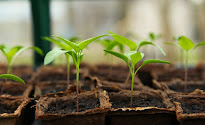Gardening Tips For Beginners
In the beginning, it's a good idea to start small when your gardening.
A small area, only 25 or 30 feet square, is enough for about 30 plants. This
will provide you with a chance to test your green thumb. If you like what you
see you can always expand later.
Choose a good site for your new garden. Gardening should be
done in an area that gets at least six hours of sunlight each day. Stay away
from large trees that take up water and nutrients, and stay at least three feet
away from fences or building
Understand that gardening is not a spotless hobby; you’re
going to have to get some dirt under your fingernails. First remove the grass, weeds, debris, and rocks.
Next, you need to dig the spot up about one foot deep. Level up the dirt and add compost or minerals
if needed. If your soil is too acidic,
add lime; if it is too sandy, add peat moss.
Plants will thrive in neutral to acidic soil with a little added
fertilizer.
If you’re planting seeds then plant the seed according to the
directions on the package. If choosing plants to plant, choose ones with green, healthy-looking leaves and stems with
healthy-looking roots. Put the smaller
plants towards the front of the bed and larger ones in the back. The key to a successful beginning in
gardening is planting at the right time.
Make sure and wait until the frosts are over before planting. If you are planting seeds the package will
usually tell you exactly when you can plant them to achieve maximum growth.
Once you
begin gardening, it is essential to make sure your plants receive enough water
to grow. Hand watering works well if you only have a few plants. Sprinklers or
sprinkler hoses may also be used. Watering is more effective during the cooler
parts of the day. During the hottest days, plants will need watering about three
times per week.
One of the
most helpful things to add to a garden is mulch or compost. Just a few inches of organic mulch will
improve fertility and help the soil hold moisture. Wood chips, grass clippings, leaves, manure,
and pine needles are some things that can be used as mulch.
Be sure to check out my youtube channel here: www.youtube.com/TomsBackyardChats

.jpg)


Comments
Post a Comment